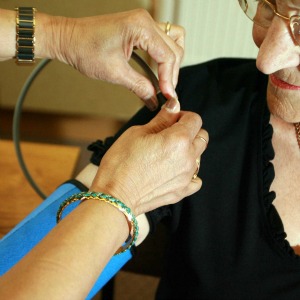
YES
Overall the NHS Health Checks programme has been a remarkable success story. It has survived a change in Government, reductions in funding, the shift to local authorities, and some media and academics who have been hostile to statins and health checks in general.
We do not know exactly how many more heart attacks and stroke have been prevented by the programme than by standard care. But as our analysis of the scheme shows, we do know that many more people at high CVD risk are being treated with statins and treatments to reduce high blood pressure than five years ago. This increase alone will have substantially cut the burden of CVD – we estimate it will have prevented around 2,500 heart attacks and strokes nationally over this first five years of the programme.
Also, since these estimates are entirely based on the reductions resulting from drug treatments, and take no account of reductions from smoking cessation or changes in diet and physical activity, the true impact of the NHS Health Checks programme will have been even greater. Extrapolating from this sample to the current 1.5 million NHS Health Checks (2014/15) nationally, it can be estimated that 5500 heart attacks and strokes will be prevented if current treatment was continued over the next five years, twice the number as in the initial period. In addition 55,000 new cases of hypertension, 13,500 new cases of diabetes and 5500 new cases of CKD will be identified every year. If all CCGs performed at the level of the current best, these numbers would be doubled.
Those with most to gain from an NHS Health Checks are those at highest risk – and the scheme is reaching many of these people. However, there are also real gains for those at a lower risk. About 80% of the total referrals for dietary and physical activity advice were for people at lower CVD risk.
Not only does the programme directly impact on preventing events, but it also helps create a climate for both personal and political change to reduce obesity and alcohol use, which require changes in both the food industry as well as in individual behaviour. For those willing to improve their health risks the NHS Health Checks programme is an important source of new information and support including newly identified conditions such as high CVD risk, diabetes, hypertension and chronic kidney disease of which patients were previously unaware.
There is a need to increase uptake of NHS Health Checks, which remains highly variable – ranging from 80% in some areas to less than 20% in others. In east London, 50% of those identified at high CVD risk (>20% QRISK2) are taking statins – if all CCGs came up to the level of the best, the current estimate of prevented CVD events would double to over 10,000 over the next five years – and smoking cessation, alcohol reduction and dietary change would add further to that saving.
Overall NHS Health Checks have made a promising start, and in future could do even better.
Dr John Robson is a GP in Tower Hamlets and clinical lead for the Clinical Effectiveness Group at Queen Mary University London

NO
There’s never been a shred of evidence anywhere on the planet that indiscriminate whole population testing works, in fact the evidence is that they induce health anxiety. Remember the NHS Health Checks scheme came about from a political whim, announced by Gordon Brown in 2008, it was and has never been justified or vindicated on scientific grounds.
The latest analysis merely confirms what the numerous previous analyses have shown, that they are a waste of money.
Firstly, the paper misleadingly claims that diagnoses made amongst attendees are all ‘new’ and would only be picked up by the program. In fact new diagnoses were also being made up among those who didn’t attend for a NHS Health Check but who attended for other reasons – opportunistic pick-up, but they have conveniently not allowed for that.
Subtract the opportunistic pick up rate and it roughly halves the programs achievements. They claim 1,934 new cases of diabetes were picked up in those that attended (a pick-up rate of 0.9%) but the baseline pick up rate amongst those that declined the invite but attended for other reasons was 0.4%. So the programme actually resulted in about 900 patients being diagnosed who might not have been diagnosed if they hadn’t seen their GP for other reasons. The same bias applies to the other conditions.
Subtracting those picked up opportunistically the programme’s pick-up rate is virtually no different from normal GP pick-up rates.
Secondly, the rate of positive risk factors in the attendees was lower than in those who declined the invite. This is a well-known phenomenon: those most interested in their health, and therefore more likely to be healthier, are more likely to respond to an invite.
If we assume it costs £1 to invite each patient and a very modest £25 (some non GP providers get paid £75) for each attendance, then the program has cost at least £7,029,000. They can reasonably claim to have picked up 6,526 new diagnoses of CKD, diabetes and blood pressure. That’s approximately £1,076 per new diagnosis vs the £25-30 cost of an ordinary GP appointment. So for each new diagnosis they could have paid for 40 routine GP appointments.
So in fact this evidence proves, as have all previous studies, that the NHS Health Checks program is simply a waste of time, effort and money. And this is before we factor in the other costs of administering the service and the consequential costs of increased health anxiety etc.
The fundamental flaw in the NHS Health Checks programme is that it is indiscriminate – it targets everyone, no matter how healthy we already know you are. You may be a non-smoking, non-drinking, normotensive, marathon running daughter of centenarian parents with normal BMI and a cholesterol of 2.5 but you’ll still be invited. GPs know their patients, we know who is fit and who isn’t. Our IT systems could easily draw up lists of those most likely to benefit from a health check and leave those who don’t need them unbothered. Until this elementary error is fixed it will remain a complete waste of valuable time effort and money.
Dr Paul Cundy is a GP in Wimbledon and chair of the GPC IT subcommittee
Image credit Dr Cundy: Andy Lane
Pulse October survey
Take our July 2025 survey to potentially win £1.000 worth of tokens













